

Mooc.org. New open-source platform. By Brad Hayward Stanford online coursework will be available starting this summer on a new open-source platform, OpenEdX, the university announced today.
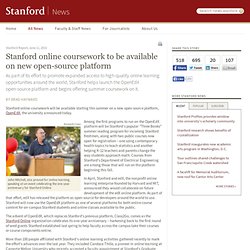
Kenneth Chan John Mitchell, vice provost for online learning, speaking at an event celebrating the one-year anniversary for Stanford Online. Among the first programs to run on the OpenEdX platform will be Stanford's popular "Three Books" summer reading program for incoming Stanford freshmen, along with two public courses now open for registration – one using contemporary health topics to teach statistics and another helping K-12 teachers and parents change the way students approach math. MOOC-based MS. By Jeffrey R.
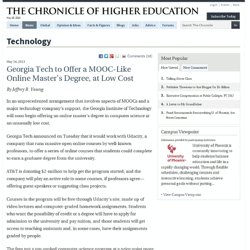
Young In an unprecedented arrangement that involves aspects of MOOCs and a major technology company's support, the Georgia Institute of Technology will soon begin offering an online master's degree in computer science at an unusually low cost. Georgia Tech announced on Tuesday that it would work with Udacity, a company that runs massive open online courses by well-known professors, to offer a series of online courses that students could complete to earn a graduate degree from the university.
AT&T is donating $2-million to help get the program started, and the company will play an active role in some courses, if professors agree—offering guest speakers or suggesting class projects. Courses in the program will be free through Udacity's site, made up of video lectures and computer-graded homework assignments. The university and Udacity will split the revenue from the paying students, with 60 percent going to Georgia Tech and 40 percent to Udacity, said Mr.
A New Approach. MOOCs on the Move. By KATHY PRETZ 1 May 2013 Massive open online courses, or MOOCs, have picked up support but also encountered criticism since my last blog about them in November.
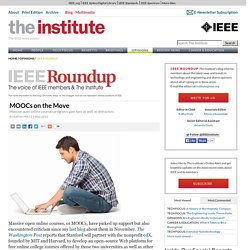
The Washington Post reports that Stanford will partner with the nonprofit edX, founded by MIT and Harvard, to develop an open-source Web platform for free online college courses offered by those two universities as well as other prestigious schools like Georgetown. Stanford has no plans to offer its own courses on the platform but will help develop a platform that edX says it hopes will be the “Linux of learning.”
MOOC Universe Players.
About MOOCs. Find Courses ~ MOOC. Learning analytics and MOOCs. By R.
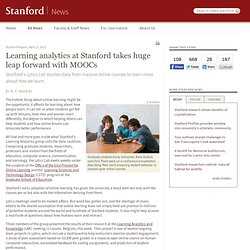
F. MacKay. Generation Rwanda. Reflections on Stanford's MOOCs. By Steve Cooper, Mehran Sahami Communications of the ACM, Vol. 56 No. 2, Pages 28-30 10.1145/2408776.2408787 Comments (1) New possibilities in online education create new challenges.
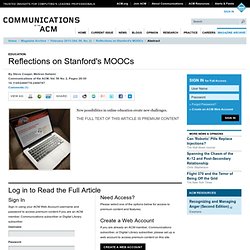
The full text of this article is premium content Need Access? Please select one of the options below for access to premium content and features. Create a Web Account If you are already an ACM member, Communications subscriber, or Digital Library subscriber, please set up a web account to access premium content on this site.
Join the ACM Become a member to take full advantage of ACM's outstanding computing information resources, networking opportunities, and other benefits. CourseTalk - MOOC Reviews & Ratings. ACE Credit Study. By Jeffrey R.
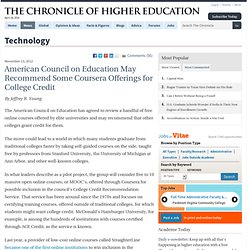
Young The American Council on Education has agreed to review a handful of free online courses offered by elite universities and may recommend that other colleges grant credit for them. The move could lead to a world in which many students graduate from traditional colleges faster by taking self-guided courses on the side, taught free by professors from Stanford University, the University of Michigan at Ann Arbor, and other well-known colleges. In what leaders describe as a pilot project, the group will consider five to 10 massive open online courses, or MOOC's, offered through Coursera for possible inclusion in the council's College Credit Recommendation Service.
That service has been around since the 1970s and focuses on certifying training courses, offered outside of traditional colleges, for which students might want college credit. The review process by the council will be "similar to the way regional accreditation works," said Molly Corbett Broad, president of ACE. The Saylor Foundation. MOOCs vs Traditional Online. Sebastian Thrun Interview. Using Khan Academy as inspiration, Sebastian Thrun decided to bring his Stanford class on artificial intelligence online.
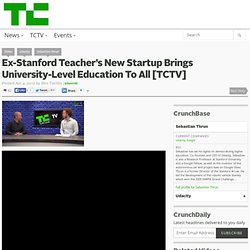
Anyone could sign up for free. And 160,000 people from around the world did. He saw the power of creating interactive lectures and distributing them for free. Effect of MOOCs on teaching. By Fred G.
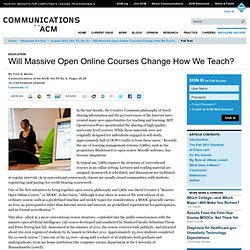
Martin Communications of the ACM, Vol. 55 No. 8, Pages 26-28 10.1145/2240236.2240246 Comments (1) In the last decade, the Creative Commons philosophy of freely sharing information and the pervasiveness of the Internet have created many new opportunities for teaching and learning. MIT OpenCourseWare spearheaded the sharing of high-quality, university-level courses. While these materials were not originally designed for individuals engaged in self-study, approximately half of OCW's traffic is from these users.6 Recently the use of learning management systems (LMSs), such as the proprietary Blackboard or open-source Moodle software, has become ubiquitous.
In typical use, LMSs support the structure of conventional courses in an online setting. One of the first initiatives to bring together open course philosophy and LMSs was David Cormier's "Massive Open Online Course," or MOOC. Daphne Koller's TED talk.